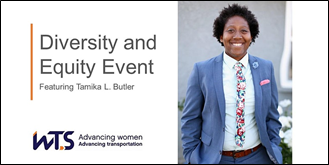Diversity and Equity Event Featuring Tamika L. Butler
By Shelley Wynne, WTS-DC
October 2021

On October 20, five WTS chapters, representing Central Virginia, DC, Hampton Roads, North Carolina-Triangle and South Carolina, hosted a virtual diversity and equity event. The WTS chapters were thrilled to offer attendees an opportunity to hear from Tamika Butler on diversity vs. inclusion, intentional inclusion and action-based plans, bystander intervention, industry-centric employee relations, and the retention rate of women and women of color in the industry. Butler is a national expert and speaker on the built environment, equity, anti-racism, diversity and inclusion, organizational behavior, and change management. As the Principal and Founder of Tamika L. Butler Consulting, Butler focuses on shining a light on inequality, inequity, and social justice. Most recently, Butler was the Director of Planning, California, and the Director of Equity and Inclusion at Toole Design. Previously, Butler served as the Executive Director of the Los Angeles Neighborhood Land Trust, a non-profit organization that addresses social and racial equity and wellness by building parks and gardens in park-poor communities across Greater Los Angeles.
To kick off the discussion, Butler proposed various questions to attendees on the topic of white spaces and if they felt that their industry, workplace, and even WTS was a center for white spaces. When asked to define "white space," Butler encouraged attendees to think about "white space" as any predominately white space without diversity and inclusion. Butler also spoke about intersectionality, or how the effects of different forms of discrimination combine, overlap, and interset. Butler emphasized the importance of this concept in creating access to affordable, reliable, and good-quality transportation and how we must consider the impact of various forms of discrimination (class, gender, ability, race, age) on transportation access. As an example, Butler pointed out that new roadway infrastructure and highways can cut off access to neighboring communities instead of providing a real transportation benefit to those communities. New highway infrastructure does provide access for commuters traveling regionally, but what about the effects on individuals without vehicles? How will they travel without a vehicle from the community where they live to the community where they work if a new highway cuts off their direct access?
Butler also talked about the importance of effecting change from positions of power and leadership within the industry. She emphasized the value and power of specific conversations and policies related to diversity and inclusion. Butler cautioned that we may want to ignore racism's role in our industry, but that won't make it go away. She discouraged attendees from being bystanders and encouraged them to effect change by putting anti-racism ideals into daily practice.
WTS-DC thanks its sister chapters in Central Virginia, Hampton Roads, North Carolina-Triangle, and South Carolina for joining forces to offer this event.